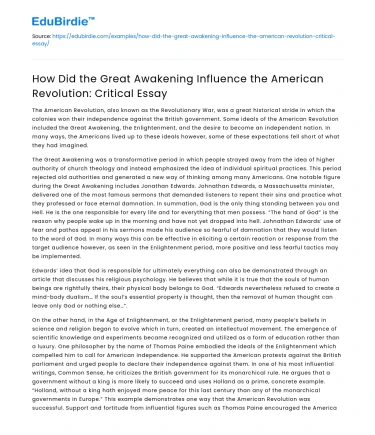The American Revolution, also known as the Revolutionary War, was a great historical stride in which the colonies won their independence against the British government. Some ideals of the American Revolution included the Great Awakening, the Enlightenment, and the desire to become an independent nation. In many ways, the Americans lived up to these ideals however, some of these expectations fell short of what they had imagined.
The Great Awakening was a transformative period in which people strayed away from the idea of higher authority of church theology and instead emphasized the idea of individual spiritual practices. This period rejected old authorities and generated a new way of thinking among many Americans. One notable figure during the Great Awakening includes Jonathan Edwards. Johnathan Edwards, a Massachusetts minister, delivered one of the most famous sermons that demanded listeners to repent their sins and practice what they professed or face eternal damnation. In summation, God is the only thing standing between you and Hell. He is the one responsible for every life and for everything that men possess. “The hand of God” is the reason why people wake up in the morning and have not yet dropped into hell. Johnathan Edwards’ use of fear and pathos appeal in his sermons made his audience so fearful of damnation that they would listen to the word of God. In many ways this can be effective in eliciting a certain reaction or response from the target audience however, as seen in the Enlightenment period, more positive and less fearful tactics may be implemented.
Save your time!
We can take care of your essay
- Proper editing and formatting
- Free revision, title page, and bibliography
- Flexible prices and money-back guarantee
Edwards’ idea that God is responsible for ultimately everything can also be demonstrated through an article that discusses his religious psychology. He believes that while it is true that the souls of human beings are rightfully theirs, their physical body belongs to God. “Edwards nevertheless refused to create a mind-body dualism… If the soul’s essential property is thought, then the removal of human thought can leave only God or nothing else…”.
On the other hand, in the Age of Enlightenment, or the Enlightenment period, many people’s beliefs in science and religion began to evolve which in turn, created an intellectual movement. The emergence of scientific knowledge and experiments became recognized and utilized as a form of education rather than a luxury. One philosopher by the name of Thomas Paine embodied the ideals of the Enlightenment which compelled him to call for American independence. He supported the American protests against the British parliament and urged people to declare their independence against them. In one of his most influential writings, Common Sense, he criticizes the British government for its monarchical rule. He argues that a government without a king is more likely to succeed and uses Holland as a prime, concrete example. “Holland, without a king hath enjoyed more peace for this last century than any of the monarchical governments in Europe.” This example demonstrates one way that the American Revolution was successful. Support and fortitude from influential figures such as Thomas Paine encouraged the Americans to follow through with their goal of gaining independence from the British.
Many significant people and events resulted in the American victory against the British government. After declaring independence from Great Britain, the national American government was able to establish the Articles of Confederation which documented the basic rules and functions of the land. As a result of this success, the Americans were able to generate a reformed system of self-governance and gained their rights as an independent nation. While some of these expectations and attempts did not achieve the desired outcome, many of their efforts were successful, thus their triumph.






 Stuck on your essay?
Stuck on your essay?

